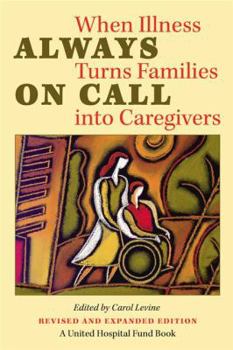Always on Call: When Illness Turns Families into Caregivers
Select Format
Select Condition 
Book Overview
Combining powerful personal stories with astute analysis and recommendations, Always on Call reveals the hidden struggles of the more than 25 million family caregivers in the United States. While family members have always provided care for one another, recent changes in health care have placed tremendous new responsibilities on them--responsibilities that, only a decade ago, were a routine part of hospital care. The prevalence of chronic...
Format:Paperback
Language:English
ISBN:0826514618
ISBN13:9780826514615
Release Date:November 2004
Publisher:Vanderbilt University Press
Length:296 Pages
Weight:1.04 lbs.
Dimensions:0.8" x 6.1" x 9.1"
Customer Reviews
3 ratings
America's Forgotten Healthcare Workers
Published by Thriftbooks.com User , 23 years ago
Are you providing care for a loved one? If so, you're not alone (although it may sometimes feel that way). As this timely book relates, about 26 million Americans are looking after an ill or disabled relative or friend. These "informal caregivers" are providing an average of 18 hours of care a week, often while holding down full-time jobs or raising families, or both. If these caregivers were paid for their work, their economic value would total $200 billion a year-one-fifth of national health care expenditures. This is far more than we spend on home health care and nursing home care--combined.This book, a collection of essays by different authors, looks at why the demands on family caregivers are growing and how the health care system can better meet their needs. The book combines the personal stories of caregivers, often movingly told, with professional insights on the impact of caregiving on workers and families. What comes through all the chapters is the lack of social support for caregivers under our current system. The cost constraints of managed care have shifted costs and caregiving responsibilities to families. Often family caregivers are required to provide high-tech assistance and perform the work that nurses or physical therapists used to perform. In trying to cope, caregivers are going it alone for the most part, and the stresses are sometimes unimaginable. In one particularly heart-wrenching chapter, Gladys Gonzalez-Ramos describes how her father finally buckled under the isolation of years of caring for his wife, who had advanced Parkinson's disease. With his wife's apparent consent, he shot her and then killed himself.Such dramatic action, of course, is not the norm. Most caregivers struggle on in silence, internalizing the stress and pain they feel. Many could benefit from psychotherapist Barry Jacobs' brief but extraordinarily helpful chapter, "From Sadness to Pride: Seven Common Emotional Experiences of Caregiving." But caregivers need more than emotional support. As Rabbi Gerald I. Wolpe puts it in his account of caring for his wife, most caregivers "are in an almost constant state of caregiving." They need breaks, they need more help from a medical system that off-loads patients onto families as quickly as possible, and they need relief from insurance companies and HMOs that are reluctant to pay for home health care.Always on Call is a much-needed step in the right direction. It is written for a broad audience--family caregivers, health care professionals, administrators, policymakers and advocates. Through its powerful first-person accounts and resources section, the book offers solace to caregivers struggling under our current system. Through its concrete suggestions for improving that system, Always on Call also offers them hope for a better future.
Fresh Air
Published by Thriftbooks.com User , 24 years ago
I heard the editor of this book interviewed on NPR Fresh Air about two months ago -- the interview was pretty incredible and was an excellent complement to the book. Take it in if you can.
A real slice of life
Published by Thriftbooks.com User , 24 years ago
This book brings home many of the realities people who care for relatives and friends face each and every day. It uses personal stories to illustrate the many ways people find themselves in the role of caregiver: the editor was catapulted into the role when her husband was in a car accident. Others found their caregiving increased as relatives slipped into the grip of Alzheimer's disease or AIDS. Beyond anecdotes, the book also asks key policy questions: like whether there are any limits to your responsibility for caring for a family member, whether the health care system is able to communicate clearly with family caregivers and accommodate their needs. It also offers clear suggestions for those who find themselves giving care including web resources and advice on how to go about looking for the help you need. This book helps put your experiences into context...both with other caregivers, and within the existing health care system. Most of all, it points up the systemic flaws, and offers suggestions for repairing a system that runs on the emotions, savings and lives of millions of American caregivers. If you don't need the information here right now, you are likely to need it in the future.






